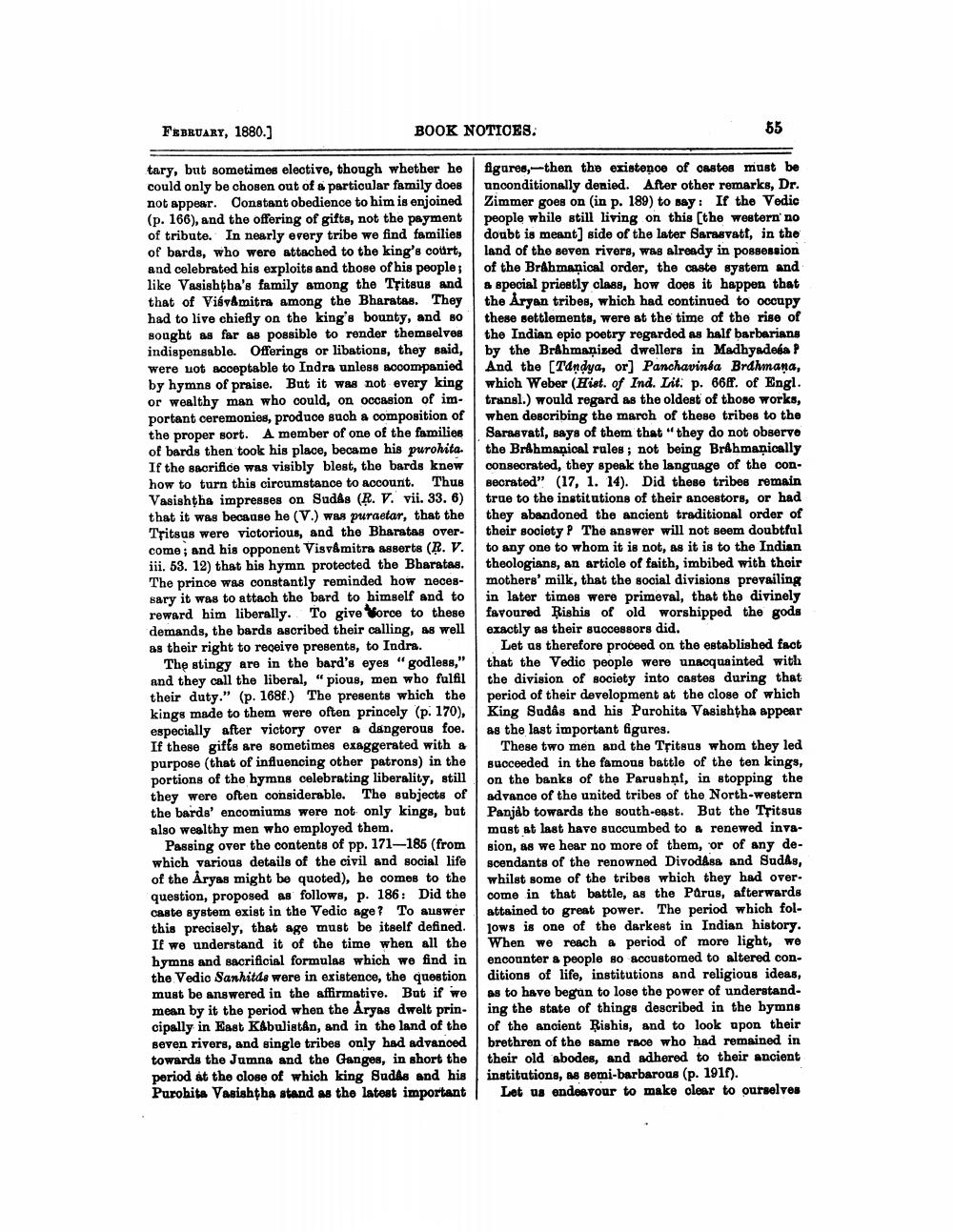________________
FEBRUARY, 1880.]
BOOK NOTICES.
55
tary, but sometimes elective, though whether he figures, then the existence of castes must be could only be chosen out of a particular family does unconditionally denied. After other remarks, Dr. not appear. Constant obedience to him is enjoined Zimmer goes on (in p. 189) to say: If the Vedic (p. 166), and the offering of gifts, not the payment people while still living on this (the western' no of tribute. In nearly every tribe we find families doubt is meant) side of the later Sarasvatt, in the of bards, who were attached to the king's court, land of the seven rivers, was already in possession and celebrated his exploits and those of his people; of the Brahmanical order, the caste system and like Vasishtha's family among the Tsitsus and & special priestly class, how does it happen that that of Visvamitra among the Bharatas. They the Aryan tribes, which had continued to occupy had to live chiefly on the king's bounty, and so these settlements, were at the time of the rise of sought as far as possible to render themselves the Indian epio poetry regarded as half barbarians indispensable. Offerings or libations, they said, by the Brahmanized dwellers in Madhyadesa ! were uot acceptable to Indra unless accompanied And the [Tandya, or] Panchavinka Brdimana, by hymns of praise. But it was not every king which Weber (Hist. of Ind. Lit. p. 668. of Engl. or wealthy man who could, on occasion of im- transl.) would regard as the oldest of those works, portant ceremonies, produce such a composition of when describing the march of these tribes to the the proper sort. A member of one of the families Sarasvati, says of them that they do not observe of bards then took his place, became his purohita the Brahmaņical rules; not being Brâhmaņically If the sacrifice was visibly blest, the bards knew consecrated, they speak the language of the conhow to turn this circumstance to account. Thus Becrated" (17, 1. 14). Did these tribes remain Vasishtha impresses on Sudás (R. V. vii. 33. 6) true to the institutions of their ancestors, or had that it was because he (V.) was purastar, that the they abandoned the ancient traditional order of Tsitsus were victorious, and the Bharatas over- their society ? The answer will not seem doubtful come, and his opponent Visv&mitra asserts (R. V. to any one to whom it is not, as it is to the Indian iii. 53. 12) that his hymn protected the Bharatas. theologians, an article of faith, imbibed with their The prince was constantly reminded how neces- mothers' milk, that the social divisions prevailing sary it was to attach the bard to himself and to in later times were primeval, that the divinely reward him liberally. To give Worce to these favoured Rishis of old worshipped the gods demands, the bards ascribed their calling, as well exactly as their successors did. as their right to receive presente, to Indra.
Let us therefore proceed on the established fact The stingy are in the bard's eyes "godless," that the Vedic people were unacquainted with and they call the liberal," pious, men who fulfil the division of society into castes during that their duty.” (p. 168f.) The presents which the period of their development at the close of which kings made to them were often princely (p. 170), King Sudás and his Parohita Vasishtha appear especially after victory over a dangerous foe. as the last important figures. If these gifts are sometimes exaggerated with & | These two men and the Tsitsus whom they led purpose (that of influencing other patrons) in the succeeded in the famous battle of the ten kings, portions of the hymns celebrating liberality, still on the banks of the Parushni, in stopping the they were often considerable. The subjects of advance of the united tribes of the North-western the bards' encomiums were not only kings, but Panjab towards the south-east. But the Tsitsus also wealthy men who employed them.
must at last have succumbed to & renewed invaPassing over the contents of pp. 171-185 (from sion, as we hear no more of them, or of any dewhich various details of the civil and social life scendants of the renowned DivodAsa and Sudas, of the Åryas might be quoted), he comes to the whilst some of the tribes which they had overquestion, proposed as follows, p. 186: Did the come in that battle, as the Parus, afterwards caste system exist in the Vedio nge? To auswer attained to great power. The period which folthis precisely, that age must be itself defined Jows is one of the darkest in Indian history. If we understand it of the time when all the When we reach a period of more light, we hymns and sacrificial formulas which we find in encounter & people so accustomed to altered conthe Vedic Sanhitds were in existence, the question ditions of life, institutions and religious ideas, must be answered in the affirmative. But if we as to have begun to lose the power of understandmean by it the period when the Aryas dwelt prining the state of things described in the hymns cipally in East Kabulistân, and in the land of the of the ancient Rishis, and to look upon their seven rivers, and single tribes only had advanced brethren of the same race who had remained in towards the Jumna and the Ganges, in short the their old abodes, and adhered to their ancient period at the close of which king Sudás and his institutions, as semi-barbarous (p. 191f). Purobita Vasishtha stand as the latest important Let us endeavour to make clear to ourselves




